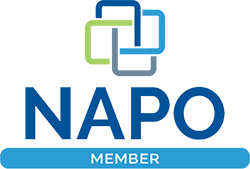Do you need help decluttering your house? Could you use a plan to get things organized around your home or office? If so, you’re probably considering hiring a professional organizer to help. Working with a professional organizer is a great way to get your space feeling functional again.
How to Get Started with a Professional Organizer
You’ve probably heard about the benefits of working with a professional organizer, but you may not know what to expect. In this article, we’re going to cover everything you need to know about what organizers can and can’t do, the preparation process, and how to hire a professional organizer you’ll absolutely love. We’re also going to include additional resources you can use to get started with an organizer near you. (HINT: If you’re in our coverage area, you should consider us first!)
We’ll review:
- What a Professional Organizer Does and Doesn’t Do
- How the Organizing Process Works
- The Rates Professional Organizers Typically Charge
- Recommendations on How to Hire the Right Organizer
- Resources You Can Use to Find the best Organizer in the Area
Professional organizers are particularly helpful guides during times of transition. Are you moving from your house or downsizing? Undergoing a renovation project? Preparing for a new baby or the addition of another family member? A professional organizer can help take the stress out of getting settled into your new arrangement.
What Does a Professional Organizer Do?
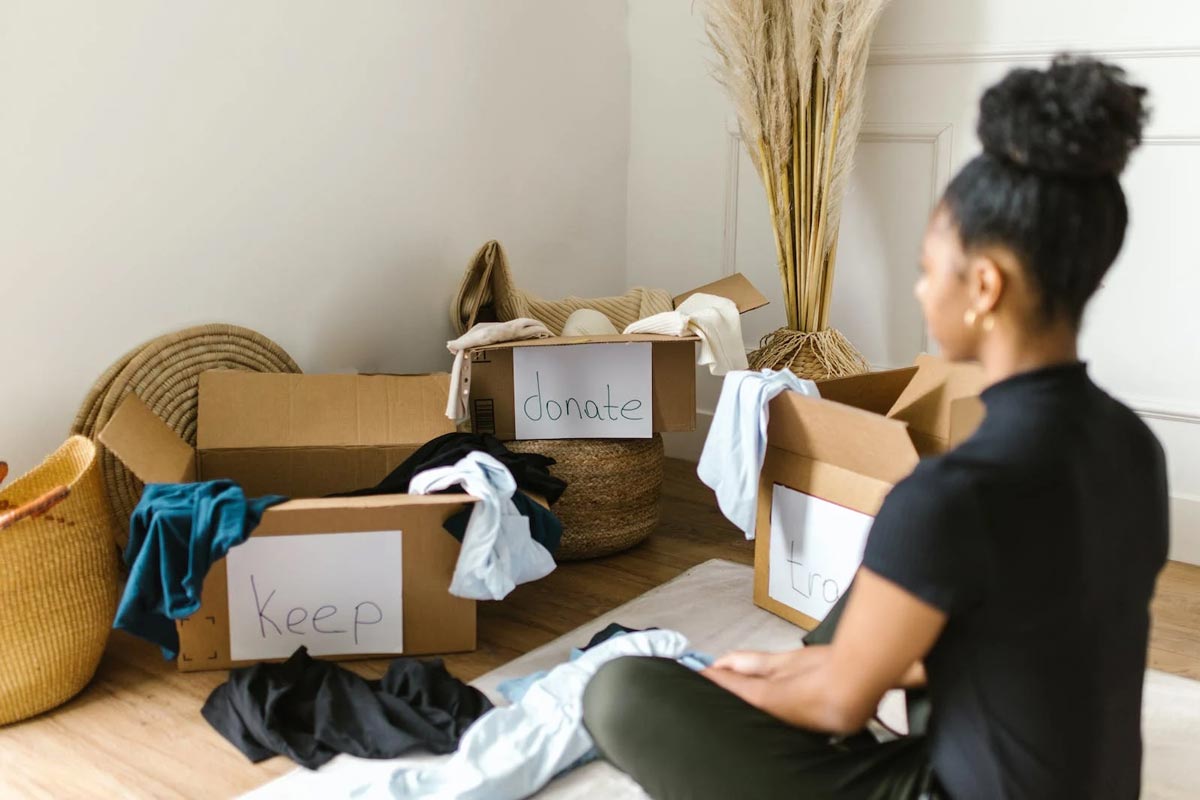
A professional organizer is someone who can help you declutter, organize, and simplify your living and work spaces. They also create customized systems for organizing items like clothing, paperwork, or kitchen supplies; making it easier for you to find what you need and maintain order.
An organizer can assist you with a wide range of tasks. This includes helping you sort through personal belongings and deciding what to keep, donate, sell, or discard. They can also help you tackle cluttered rooms, properly arrange and pack your stuff before a move, and more.
Although there are no formal requirements to start working as a professional organizer, experienced professionals are usually CPO certified. The National Organization of Professional Organizers (NAPO) requires prospective organizers to submit proof of at least 1,500 hours of paid work in the last five years as an organizer in a professional capacity.
What to Expect from a Professional Organizer
The primary goal of an organizer is to help you maximize the use of your target areas by suggesting the best ways to utilize available space. They will also make workflow recommendations. For example, they might help you create a better layout for your furniture, suggest clever storage options for your home, or recommend tools to help you stay organized.
In addition, a professional organizer can help you develop strategies for prioritizing and managing your time more effectively. They can show you how to create to-do lists, develop routines, and use digital tools to keep track of your schedule and tasks.
Professional organizers also help their clients work through some of the psychological challenges of getting organized. Parting with belongings that no longer belong can be an emotional task for some, while others need to work through why they have been disorganized in the first place. An experienced organizer will likely be familiar with tools and support services that can help.
Overall, a professional organizer can provide a fresh perspective and valuable guidance to help you simplify your life and improve your organizational skills. However, one thing to note is that professional organizers do not clean the spaces they organize. More often than not, a professional organizer will work in conjunction with a cleaning service if its necessary to fulfill the task at hand.
The Process of Working With a Professional Organizer
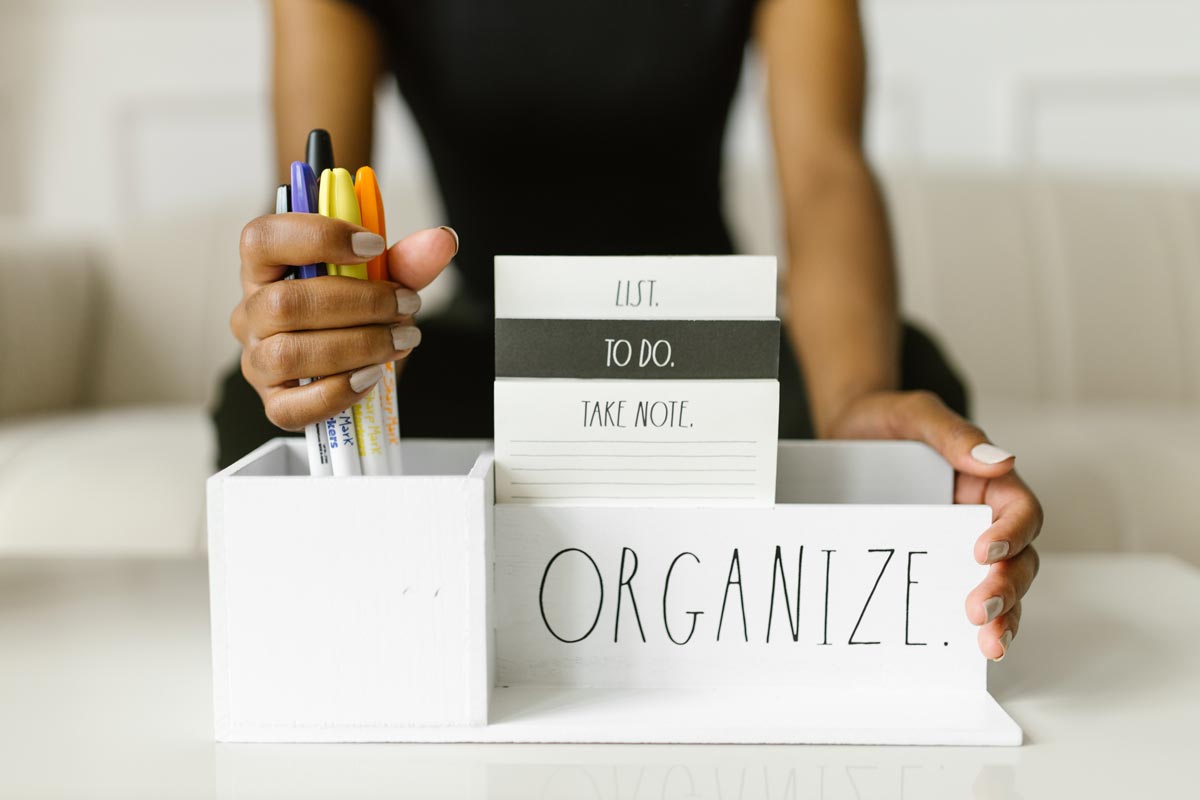
Working with a professional organizer can be an incredibly rewarding experience that can help you transform your space and simplify your life. However, in many cases, it’s not necessarily a one-time service. Working with a professional organizer is usually an ongoing process that takes time, energy and commitment from both sides. Before you hire a professional organizer, you need to be clear on your needs.
If you’re looking for a short-term arrangement or just need help getting started on your own, consider hiring someone for a few hours or days. For ongoing support, consider hiring an organizer to help you tackle specific areas of your home or office each week. This is ideal if you are overwhelmed by the idea of tackling everything at once, or if you have time constraints like children or other responsibilities.
In either case, it’s important that both parties have a clear understanding about what the expectations are before the project gets started. Knowing what will be accomplished during each visit, ensures that no one feels disappointed when certain tasks aren’t completed within a certain time frame. It also clarifies how frequently the appointments should occur in order to reach organizational goals.
Consultation with the Professional Organizer
The first step in working with a professional organizer is typically an initial consultation. This might be done over the phone, via virtual meeting, or in person.
Good organizers will usually spend at least 30 minutes getting to know you and your situation before recommending any solutions. They will likely ask you questions about what you want to get out of this process and what your goals are. They will also want to know whether you have any other organizing projects going on in other areas of your life, such as at work.
Use this opportunity to talk about your organizing needs and goals. Also give the organizer a sense of your space and how you currently use it. If you can, provide pictures or videos of the spaces you most want to address during this call.
During the consultation, the organizer will likely explain their specific process for approaching certain tasks, their fees, and what you can expect from working together.
1. The Organizer Conducts an Assessment
After the consultation, the organizer will likely schedule a time to make an assessment prior to starting the work. During this assessment, they will come to your home or office to review the details of your project and get a better sense of what needs to be organized.
This may also involve the organizer taking measurements, familiarizing themselves with access or personnel requirements, and taking stock of any organizational tools or supplies you already have.
2. The Organizational Plan is Developed
Once the assessment is complete, the organizer will create a plan for organizing the space. This may involve decluttering, rearranging furniture, creating storage solutions, and implementing organizational systems.
A good plan will be tailored to your specific needs and goals, and the organizer will discuss it with you to make sure you’re on board before any changes are made. If there are sensitive details involved, it’s a good idea to have the organizer present the plan in writing (if they aren’t doing so already). Both parties should understand what needs to be done and when it should be done by.
You’ll need to agree on any changes together before moving forward with the project. This is important, because if there is any disagreement between you and the organizer during this stage it could cause problems down the road when things aren’t working out as planned.
3. The Implementation Process Begins
Executing on the organizational plan is where the rubber meets the road. With the plan in place, the organizer will begin the process of implementing it. This may involve working with you to declutter and purge items that are no longer needed. This may also involve rearranging furniture or storage solutions, and setting up organizational systems like filing systems, labeling, or color coding.
You’ll work closely with your professional organizer throughout this phase, which usually takes place over several weeks or months after the initial meeting. They will provide guidance and support as needed, helping you stay on track and focused on your goals.
It’s important to maintain open and ongoing communication with the organizer during this phase. They will likely ask for feedback on the solutions they’ve implemented, and may make adjustments as needed to ensure that the solutions are working for you.
4. Following Up and Ongoing Work
Once the scope of the organizational project has been fulfilled, the organizer may schedule follow-up sessions to check in on how things are going. They may look to make necessary tweaks to the organizational systems to improve workflows. They may also provide tips and strategies for maintaining the organization and preventing clutter from building up in the future.
How Much Does it Cost to Work with a Professional Organizer?
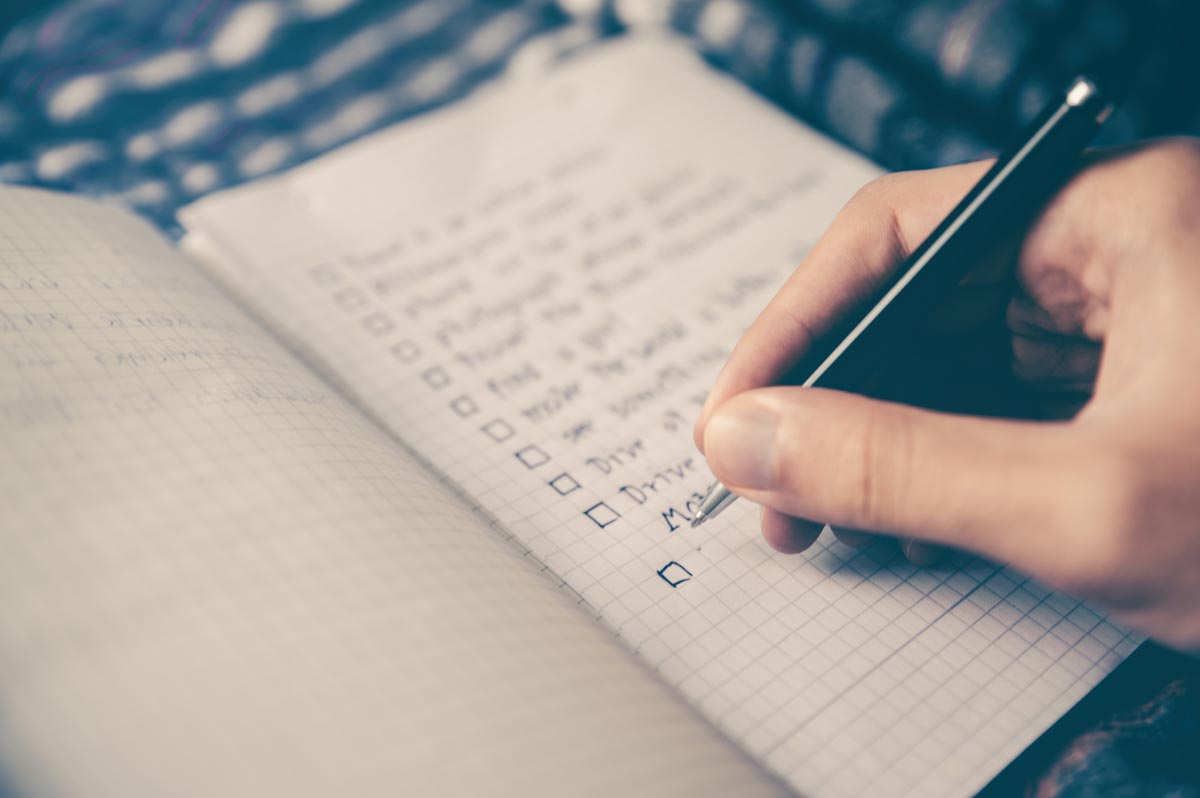
The cost of a professional organizer can vary widely depending on several factors such as their location, experience, and the specific services they provide. For instance, professional organizers in major cities and urban areas tend to charge more compared to those in suburban or rural areas.
The broadest cost estimates can range from $35 to $200 per hour. However, in general, you can expect to pay anywhere from $50 to $140 per hour for a professional organizer. The total cost of working with a professional organizer on a singular project can range from $250 to $850, on average. However, expect to pay more for multiple rooms or projects that will likely span several days, weeks, or months.
Do you know the hourly rate? If you want to get a rough idea of how much it might cost to work with a professional organizer, check out our chart to estimate the total cost of working with a professional organizer.
How to Find the Right Professional Organizer for You

Before you reach out to a professional organizer, you should be clear on what your goals are, the time frame involved, and your budget. Hiring a Professional organizer can be expensive, and it’s important to have a clear understanding of the details involved before you start the process.
Questions to Ask a Professional Organizer You Want to Hire
NAPO has a recommended list of questions consumers should ask before making a choice:
- How long have you been working in the organizing and productivity industry?
- What types of services do you offer?
- Are there areas you specialize in?
- Have you had special training or do you hold any certifications related to your work?
- Please describe your process for helping clients achieve their desired outcomes.
- Please describe a typical working session.
- Will I work directly with you, or will you assign an employee or subcontractor?
- What is your fee structure?
- Do you work with a written agreement?
- What is your cancellation policy?
- Can you provide references?
- I have tried to get organized before. How will this be different?
Check Credentials
Most professional organizers with training and experience are members of NAPO, or other professional organizations like The American Society of Professional Organizers (AMSPO). It’s highly recommended that you make sure the professional organizer is certified or has received training from a reputable organization.
Build Rapport
Additionally, just like any other service provider, it’s important to find a professional organizer whose personality and approach align with your own. Make sure you feel comfortable with the organizer and that they understand your goals and preferences.
Ask for References
Consider asking the professional organizer for references from past clients. This can give you an idea of their experience and the quality of their work.
Consider Their Specialty
Some professional organizers specialize in specific areas such as home organizing, office organizing, or decluttering. Consider finding an organizer who has experience in the type of organizing you need.
Be Prepared Beforehand
Identify your goals. Before you start working with a professional organizer, take some time to think about what you hope to achieve. This will help you communicate your goals clearly to the organizer and ensure that you’re both on the same page.
Gather information. If you’re organizing a specific area, such as a closet or a home office, gather information about the dimensions, layout, and contents of the space. This will help the organizer plan and prioritize the organizing process.
Make a list of items you want to keep. Take some time to go through your belongings and make a list of items you want to keep, donate, or sell. This will make it easier for you and the organizer to make decisions about what to keep and what to let go of.
Declutter in advance. If you have the time, try to declutter the area before the organizer arrives. This will save time and ensure that you’re starting the organizing process with a clean slate.
Be realistic. Be honest with yourself and the organizer about the amount of time and effort you’re willing to put into the organizing process. This will help set realistic expectations and ensure that the process is manageable and sustainable for you.
Common Difficulties Working with an Organizer
Resistance to change. Change can be difficult, and many people struggle with letting go of possessions that have sentimental or emotional value. A professional organizer can help you make tough decisions, but it’s important to be prepared for some emotional challenges.
Resistance to the organizing process. Some people may resist the organizing process, either because they don’t believe they need help, or because they’re not sure they’re ready to change their habits. It’s important to have open and honest communication with the organizer and be willing to work together to overcome these challenges.
Time constraints. Organizing can be time-consuming, and it’s important to have a clear understanding of how much time you’re willing to commit to the process. If you’re short on time, the organizer may need to work within certain constraints, which can affect the outcome of the organizing process.
Maintaining organization. After the organizing process is complete, it’s important to maintain the organization. The professional organizer can provide guidance and support, but it’s ultimately up to you to adopt new habits and keep the space organized.
Other Resources for Finding a Professional Organizer
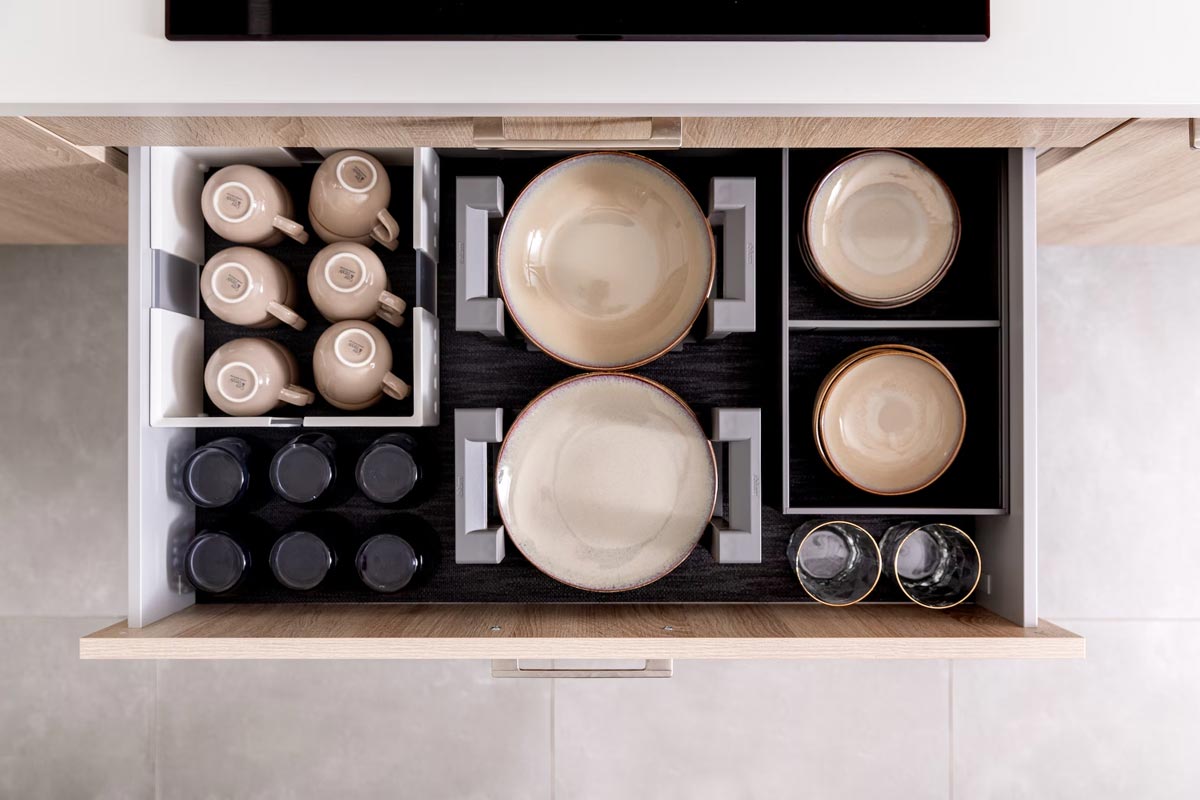
Professional organizations like NAPO and AMSPO have a directory of certified professional organizers on their websites. You can search for organizers in your area and compare their qualifications and services.
Visit the NAPO directory: https://pro.napo.net/
Visit the AMSPO directory: https://www.amspo.org/find-an-organizer
Online review platforms such as Yelp, Google, and Angi can also provide you with valuable information about the quality of service and reputation of a particular professional organizer. Established organizers should have reviews from past clients, so you can get a sense of the organizer’s communication style and level of professionalism.
As a final thought, remember that word of mouth is a powerful tool. Ask friends, family, and colleagues if they have used a professional organizer in the past and if they would recommend them. By using these resources and doing your research, you’ll be able to make an informed decision when hiring a professional organizer.
That concludes our complete guide to working with a professional organizer; everything you need to know and how to get started. The Personal Helpers provides home and office organization services to the New York City area, as well as other specialty services. If you’re in need of a professional organizer and live in the New York City area, please give us a call!
Let us know if we missed something by leaving a comment. Thanks!
Interested in working with us?




